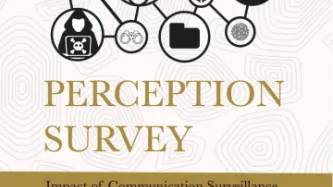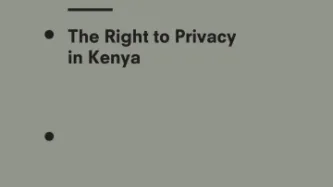Search
Content type: Examples
After Uber refused requests to adjust prices following a rise in the cost of fuel, Kenya's Organisation of Online Drivers union of about 15,000 began circulating its own chart listing fares about 50% higher than Uber's official prices. Members using it are prioritising customers who pay by cash or M-Pesa and turn down customers who want to pay using Uber's app. As the rate card has become more familiar, customers are showing less resistance to these new driver-set prices. Uber says the…
Content type: Examples
A former TikTok moderator in Kenya has threatened a lawsuit against TikTok's owner, ByteDance, alleging that he has developed PTSD as a result of his work for the company and that he was unfairly dismissed for advocating for better working conditions. In a letter, his lawyer alleges that the job required him to watch 250 to 350 videos per hour, the vast majority of them "horrific in nature".https://time.com/6293271/tiktok-bytedance-kenya-moderator-lawsuit/ Publication: Time MagazineWriter…
Content type: Examples
Data-driven wellbeing audits are becoming common in classrooms in Denmark, which has long invested heavily in digital teaching aids and interactive learning. In the last few decades, depression among Danish children has sextupled, and a quarter of ninth-graders report having attempted self-harm. Platforms such as Woof offer teachers regular feedback based on anonymous self-reports. Similar systems in the US extend to surveilling students' emails, chat, and searches.Experts are concerned that…
Content type: Examples
The rise of hybrid work has led to a rise in "bossware": increasingly intrusive technology that monitors employees, tracks their locations, and watches or listens to office workers via cameras and microphones. 90% of such systems can give employers a list of everything a worker has done that day. The cost of such systems has dropped, as has employer trust in staff. The increasing surveillance, now with AI predictive functions, threatens job security and increases the power companies have over…
Content type: Examples
Behind every powerful AI system are huge numbers of people labelling and clarifying data to train it, contracted by companies like Remotasks, a subsidiary of Silicon Valley-based data vendor Scale AI, whose customers include the US military and OpenAI. Often the workers, who are assigned tasks they don't understand for a purpose they don't know, are sworn to secrecy. Yet labelling is crucial; it can make the difference between a car stopping to spare the person walking a bike across the road or…
Content type: Examples
More than 150 workers employed by third-party outsourcing companies to provide content moderation for AI tools on Facebook, TikTok, and ChatGPT depend have pledged to create the African Content Moderators Union. The move to create such a union began in 2019 when the outsourcing company Sama fired Facebook content moderator Daniel Motaung for trying to form a union. https://time.com/6275995/chatgpt-facebook-african-workers-union/Publication: TimePublication date: 2023-05-01Writer: Billy…
Content type: Examples
Four people in Kenya have filed a petition calling on the government to investigate conditions for contractors reviewing the content used to train large language models such as OpenAI's ChatGPT. They allege that these are exploitative and have left some former contractors traumatized. The petition relates to a contract between OpenAI and data annotation services company Sama. Content moderation is necessary because LLM algorithms must be trained to recognise prompts that would generate harmful…
Content type: News & Analysis
In a ruling handed down on 14 October 2021 by the High Court of Kenya in relation to an application filed by Katiba Institute calling for a halt to the rollout of the Huduma card in the absence of a data impact assessment, the Kenyan High Court found that the Data Protection Act applied retrospectively.
Background to the case
Huduma Namba as initially proposed
In January 2019, the Kenyan Statute Law (Miscellaneous Amendment) Act No. 18 of 2018 came into effect, introducing a raft of amendments…
Content type: Long Read
This piece was last updated in June 2021.
In many countries, access to social protection (such as welfare programmes or healthcare) is made conditional on producing a form of identification (“ID”). But obtaining a recognised and accurate ID is often a process riddled with discriminatory designs, bureaucracy and technical failures that prevent individuals from accessing the services they are entitled to. Even when people eventually get an ID, it might not accurately reflect who they are,…
Content type: Report
Human rights defenders across the world have been facing increasing threats and harms as result of the use of digital and technological tools used by governments and companies which enable the surveillance, monitoring and tracking of individuals and communities. They are continuously at risk of violence, intimidation and surveillance as a direct consequence of the work they do. Such surveillance has been shown to lead to arbitrary detention, sometimes to torture and possibly to extrajudicial…
Content type: Video
You can listen and subscribe to the podcast where ever you normally find your podcasts:
Spotify
Apple podcasts
Google podcasts
Castbox
Overcast
Pocket Casts
Peertube
Youtube
Stitcher
And more...
And support PI's work here: support.privacyinternational.org
Content type: Examples
EU health commissioner Stella Kyriakides told health ministers in late May that they could not count on immunity certification when lifting cross-border travel restrictions within the EU. Prevention measures such as physical distancing, robust testing strategies, and ensuring health care capacity were more important. Contact tracing apps might help, but would need to be interoperable.
https://www.politico.com/news/2020/05/25/european-union-commissioner-coronavirus-immunity-certificates-arent-…
Content type: Examples
Kenya’s Independent Policing Oversight Body reports that it received 87 complaints covering 31 incidents in which injuries were linked to the actions of police officers and 15 deaths between curfew’s imposition on March 27 and June 5. In April, Human Rights Watch accused the police of brutality in imposing the curfew from the beginning, including whipping, kicking, and teargassing people.
Publication: Guardian
Publication date: 2020-06-05
Content type: Video
You can find out more about Haki na Sheria here: http://hakinasheria.org/
Find out more about double registration in Keren's piece "In Kenya, thousands left in limbo without ID cards" in CodaStory: https://www.codastory.com/authoritarian-tech/kenya-biometrics-double-registration/
Find out more about the Huduma Namba case on our website: https://privacyinternational.org/news-analysis/3350/why-huduma-namba-ruling-matters-future-digital-id-and-not-just-kenya
You can listen and…
Content type: Examples
From our partners from the Defenders Coalition: The civil society’s Police Reforms Working Group, comprised of twenty national human rights organisations, condemn the unnecessary and excessive use of force by Kenya Police Service officers yesterday at the Likoni Ferry Crossing, Mombasa. The police actions completely betrayed the specific responsibility bestowed upon them by the President; to facilitate orderly passage of commuters on the Likoni crossing.
Link to their reaction: https://…
Content type: Case Study
The run up to Kenya’s 2017 elections was extremely tense. Kenya has a history of violently fought elections and there was fear this election would be no different. It was in this tense environment, that companies like Cambridge Analytica and Harris Media – and their digital offerings - got involved in the election campaigns.
Cambridge Analytica’s business model is by now familiar, they compiled a huge amount of data points, often through illegal means, to create profiles on individuals –…
Content type: Examples
In order to enforce mandatory 14-day quarantine orders, Kenyan authorities have been tracking mobile phones of people suspected to have COVID-19. Also in Kenya, police enforcement efforts have led to several deaths: three died of injuries from being beaten, one, a 13-year-old boy, was hit by a bullet.
Source: https://www.bbc.co.uk/news/world-africa-52214740
Writer: Dickens Olewe
Publication: BBC News
Content type: Advocacy
To the Members of the European Parliament and to the Committee on Budgets of the European Parliament
The EU urgently needs to step up and provide assistance to protect the health and safety of people trapped in camps on the Greek islands - not just to protect their welfare, but to contain the virus itself as a matter of global public health.
However, as we detail in the briefing below, the current European Commission proposal for funds allocation is insufficient to ensure the safety of…
Content type: Examples
8 europeans telecoms providers (Vodafone, Deutsche Telekom, Orange,Telefonica, Telecom Italia , Telenor, Telia and A1 Telekom Austria) have agreed to share mobile phone location data with the European Commission to track the spread of the coronavirus.
The Commission said it would use anonymsed data and aggregated mobile phone location to coordinate the tracking of the virus spread. They also announced the data would be deleted after the crisis.
Source: https://www.reuters.com/article/us-…
Content type: Examples
The European Commission urged Europe's telecoms giants, including Deutsche Telekom and Orange, to share their users' mobile data streams from across the region to help predict the spread of the coronavirus "for the common good". In a letter in response, Dutch Renew MEP Sophie In't Veld stressed that that data must remain anonymised, and questioned the usefulness of aggregating very large quantities of location data from millions of Europeans who are locked down. Meanwhile, questions are being…
Content type: Long Read
Background
Kenya’s National Integrated Identity Management Scheme (NIIMS) is a biometric database of the Kenyan population, that will eventually be used to give every person in the country a unique “Huduma Namba” for accessing services. This system has the aim of being the “single point of truth”, a biometric population register of every citizen and resident in the country, that then links to multiple databases across government and, potentially, the private sector.
NIIMS was introduced…
Content type: News & Analysis
On 30 January 2020, Kenya’s High Court handed down its judgment on the validity of the implementation of the National Integrated Identity Management System (NIIMS), known as the Huduma Namba. Privacy International submitted an expert witness testimony in the case. We await the final text of the judgment, but the summaries presented by the judges in Court outline the key findings of the Court. Whilst there is much there that is disappointing, the Court found that the implementation of NIIMS…
Content type: Advocacy
We welcome the effort by the Government of Kenya to give life to and specify the right to privacy, already enshrined in Article 31(c) and (d) of the Constitution of Kenya by proposing a draft Data Protection Act. We particularly appreciate the direct reference to this Constitutional right in the purpose of the Act and the way it is referred to on several occasions in the Act.
While these efforts have positive intentions and we are pleased that Kenya has adopted a comprehensive data protection…
Content type: Case Study
On 3 December 2015, four masked men in plainclothes arrested Isnina Musa Sheikh in broad daylight (at around 1 p.m.) as she served customers at her food kiosk in Mandera town, in the North East of Kenya, Human Rights Watch reported. The men didn’t identify themselves but they were carrying pistols and M16 assault rifles, commonly used by Kenyan defence forces and the cars that took her away had their insignia on the doors. Isnina’s body was discovered three days later in a shallow grave about…
Content type: Advocacy
This stakeholder report is a submission by Privacy International (PI), the National Coalition of Human Rights Defenders Kenya (NCHRD-K), The Kenya Legal & Ethical Issues Network on HIV and AIDS (KELIN), and Paradigm Initiative.
PI, NCHRD-K, KELIN, and Paradigm Initiative wish to bring their concerns about the protection and promotion of the right to privacy, and other rights and freedoms that privacy supports, for consideration in Kenya’s upcoming review at the 35th session of the Working…
Content type: Advocacy
We welcome the effort by the Government of Kenya to give life to and specify the right to privacy, already enshrined in Article 31(c) and (d) of the Constitution of Kenya by proposing a draft Data Protection Act. We particularly appreciate the direct reference to this Constitutional right in the purpose of the Act and the way it is referred to on several occasions in this proposed Bill.
Development of an effective and comprehensive Data Protection law in Kenya is a priority. In…
Content type: News & Analysis
Photo: The European Union
On 2 September 2019, Privacy International, together with 60 other organisations, signed an open letter to the European Parliament to express our deep concern about upcoming EU policy proposals which undermine the EU’s founding values of human rights, peace and disarmament.
Since 2017, the EU has diverted funds towards security research and security capacity-building in countries around the world. The proposal for the EU's next budget (2021-2027) will…
Content type: Examples
In September 2018, EU’s antitrust watchdog, the European Commission, launched a preliminary investigation into how the platform uses data about merchants. Margrethe Vestager, EU Competition Commissioner said that the informal probe concerns the e-commerce group’s dual role as a competitor while simultaneously acting as a host to third-party merchants, who sell goods on Amazon’s websites. “The question here is about the data,” Ms. Vestager said.
The Amazon marketplace investigation follows up…
Content type: Press release
The Irish Data Protection Commission has today launched an inquiry into the data practices of ad-tech company Quantcast, a major player in the online tracking industry. PI's 2018 investigation and subsequent submission to the Irish DPC showed how the company is systematically collecting and exploiting people's data in ways people are unaware of. PI also investigated and complained about Acxiom, Criteo, Experian, Equifax, Oracle, and Tapad.
PI welcomes this announcement and its focus on…














